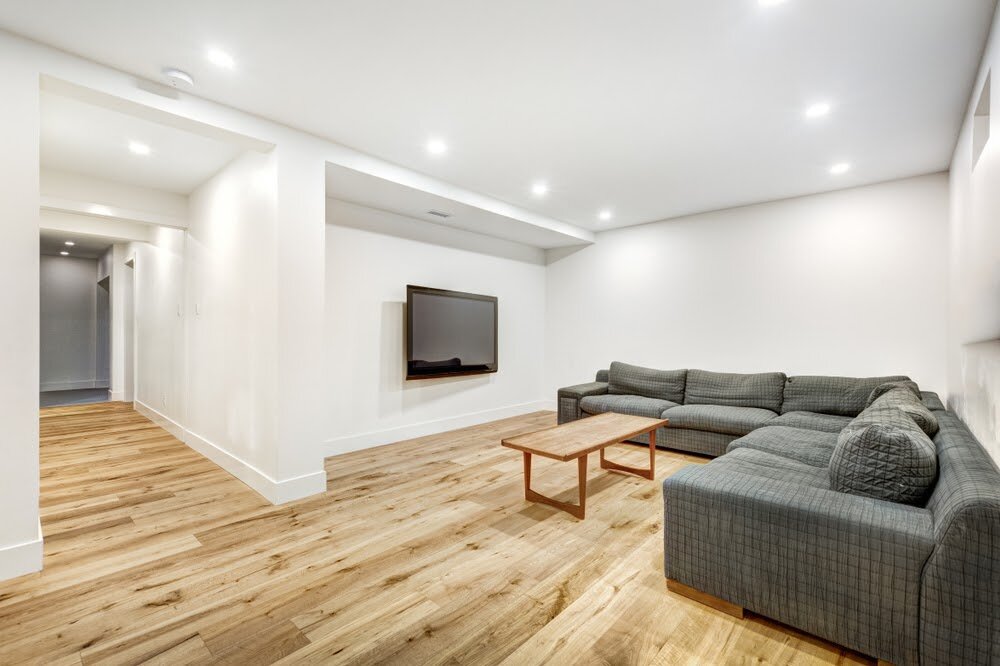Basements can serve various functions, whether it’s a space for family living or simply storage. It all depends on what you need. The same goes for what flooring you use to finish your basement. Do you want something more livable or practical? Find out what flooring companies recommend for your home.
How to Choose the Right Floor for Your Basement
What Makes Basement Floors Different?
The flooring of a basement is different from flooring in any other part of your home. Residual moisture and vapor remain close to the ground, making it easy to fester and collect when exposed to the slightest amount of precipitation in the air. This is why it can be so easy for flooding to happen when the flooring isn’t installed adequately, especially at the lowest level of your home. Heavy rain can become inches of standing water that will lead to tons of repairs and damages. You’ll want to keep in mind how to avoid and prevent moisture by finding a flooring option that is water-resistant and dries with minimal long-term damages.
What to Avoid
It’s good to bypass soft materials, such as carpet, in favor of harder materials, such as vinyl. Carpet flooring, especially those with longer fibers, are a breeding ground for moisture build-up and mold production. Once they get wet, it’s challenging to dry them without proper ventilation, which most basements wouldn’t have.
Hardwoods don’t like water, so over time, the moisture in the air would cause the flooring to warp, rot, and grow mold. They’re also expensive to replace so avoiding them in humid areas is essential.
What to Use
You’ll want to consider manufactured products over natural options. Try to find a flooring option that requires fewer layers or subfloors. This prevents water from sneaking through cracks and settling between the layers to grow mold.
The flooring industry has engineered and elevated some great options for today’s homeowners, so you can focus on enjoying your basement without all of the fuss. Vinyl plank flooring and vinyl tile are growing in popularity because they have a great look and impressive durability. With vinyl flooring, there is little you have to compromise on. The material is water-impervious and traps heat, which is ideal for basement flooring. Vinyl is inexpensive and easy to re-install if there’s ever a problem. With plank flooring, the smaller grout lines make it harder for water to permeate the surface and prevent moisture build-up.
Laminate wood flooring is also a good option because it promotes warmth on your basement floor. The installation process is easy, and it absorbs sound when little ones are running about. The only catch with laminate floor is its durability when exposed to excess water. Typical basement humidity isn’t going to be a problem, but when met with flooding that isn’t removed quickly, certain spots of your laminate floor might need to be replaced.
Concrete and rubber floors are great options, but they are used less likely for family living areas and more for storage and exercise basement spaces. However, it’s one of the most reliable options if you just need a place to store things and can even withstand moisture.
Rubber flooring tiles are opposingly great for insulating a basement. They trap heat and offer great support for your feet, unlike concrete. However, they, too, usually only offer space for play, exercise, and storage.
What’s Next?
It all comes down to what you and your family ultimately need. Are you looking for function, fashion,or both? There is plenty to choose from, so you can find what you’re looking for.
The experts at Ozburn-Hessey Company are ready to step in with a wide breadth of knowledge and answer all of your questions. This isn’t a journey you have to take alone. The Ozburn-Hessey Company has generations of experience to provide you with a personalized solution guaranteed to leave you satisfied. Call Ozburn-Hessey today!




